状语从句的省略规则
- 格式:doc
- 大小:19.00 KB
- 文档页数:1
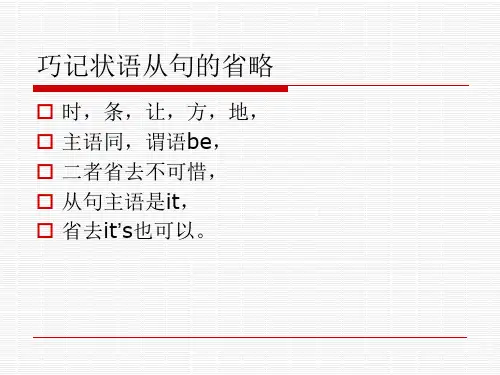
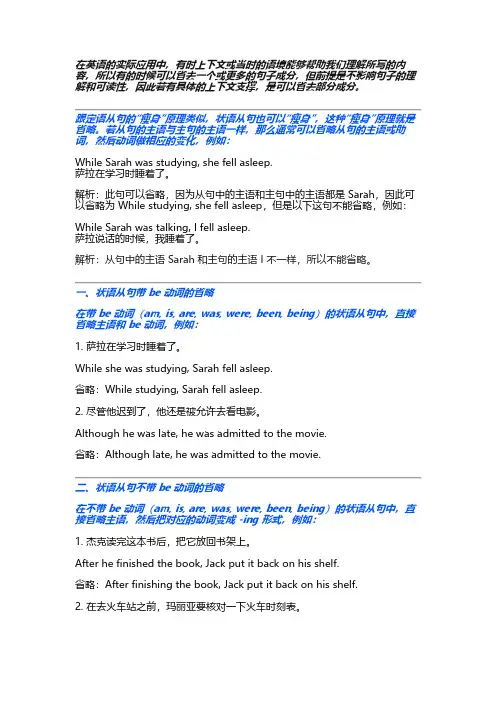
在英语的实际应用中,有时上下文或当时的语境能够帮助我们理解所写的内容,所以有的时候可以省去一个或更多的句子成分,但前提是不影响句子的理解和可读性,因此若有具体的上下文支撑,是可以省去部分成分。
跟定语从句的“瘦身”原理类似,状语从句也可以“瘦身”,这种“瘦身”原理就是省略。
若从句的主语与主句的主语一样,那么通常可以省略从句的主语或助词,然后动词做相应的变化,例如:While Sarah was studying, she fell asleep.萨拉在学习时睡着了。
解析:此句可以省略,因为从句中的主语和主句中的主语都是 Sarah,因此可以省略为 While studying, she fell asleep,但是以下这句不能省略,例如:While Sarah was talking, I fell asleep.萨拉说话的时候,我睡着了。
解析:从句中的主语 Sarah 和主句的主语 I 不一样,所以不能省略。
一、状语从句带 be 动词的省略在带 be 动词(am, is, are, was, were, been, being)的状语从句中,直接省略主语和 be 动词,例如:1. 萨拉在学习时睡着了。
While she was studying, Sarah fell asleep.省略:While studying, Sarah fell asleep.2. 尽管他迟到了,他还是被允许去看电影。
Although he was late, he was admitted to the movie.省略:Although late, he was admitted to the movie.二、状语从句不带 be 动词的省略在不带 be 动词(am, is, are, was, were, been, being)的状语从句中,直接省略主语,然后把对应的动词变成 -ing 形式,例如:1. 杰克读完这本书后,把它放回书架上。
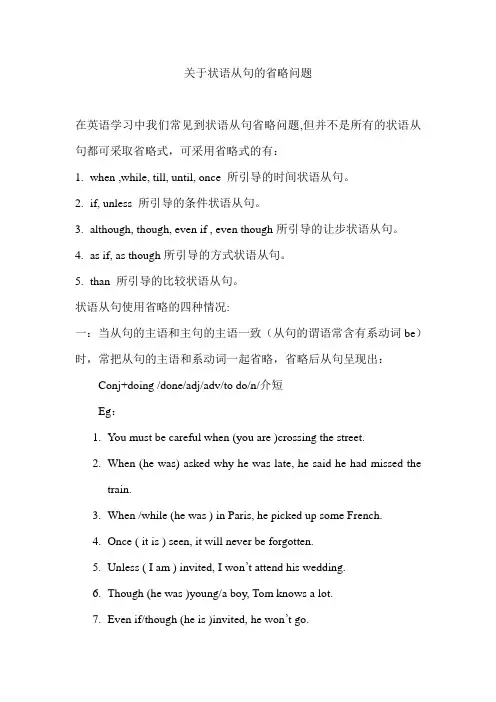
关于状语从句的省略问题在英语学习中我们常见到状语从句省略问题,但并不是所有的状语从句都可采取省略式,可采用省略式的有:1.when ,while, till, until, once 所引导的时间状语从句。
2.if, unless 所引导的条件状语从句。
3.although, though, even if , even though所引导的让步状语从句。
4.as if, as though所引导的方式状语从句。
5.than 所引导的比较状语从句。
状语从句使用省略的四种情况:一:当从句的主语和主句的主语一致(从句的谓语常含有系动词be)时,常把从句的主语和系动词一起省略,省略后从句呈现出:Conj+doing /done/adj/adv/to do/n/介短Eg:1.You must be careful when (you are )crossing the street.2.When (he was) asked why he was late, he said he had missed thetrain.3.When /while (he was ) in Paris, he picked up some French.4.Once ( it is ) seen, it will never be forgotten.5.Unless ( I am ) invited, I won’t attend his wedding.6.Though (he was )young/a boy, Tom knows a lot.7.Even if/though (he is )invited, he won’t go.8.He must be somewhere around if (he is )not here/in the office.9.They looked around the room as if /though (they were)looking forsomething.10.H e opened his mouth as if /though (he was) to say something.11.H e is much taller than (he is) expected.12.I can’t do it until (I am) told how to.13.W hen/while (he was) still a boy, he began to support himself.14.I f (water is )heated to a higher temperature, water will be turnedinto steam.15.T he research is so designed that once_____, nothing can be doneto change it.A beginsB having beganC beginningD begun(D)16. The 18—storied building ,when ______, will shut out the sun lighting up the rooms in my house.A completed B. to be completed C. completing D. have completed (A)17. The flowers will die unless ______every day .A wateredB wateringC waterD to water (A)二:当从句的主语和主句的逻辑主语一致时,也可把从句省略为Conj+doing /done/adj/adv/to do/n/介短,此种用法主要是用来描述或说明某种现象或情况,是“对事不对人”,而第一种情况是就具体的人或事来说明的。
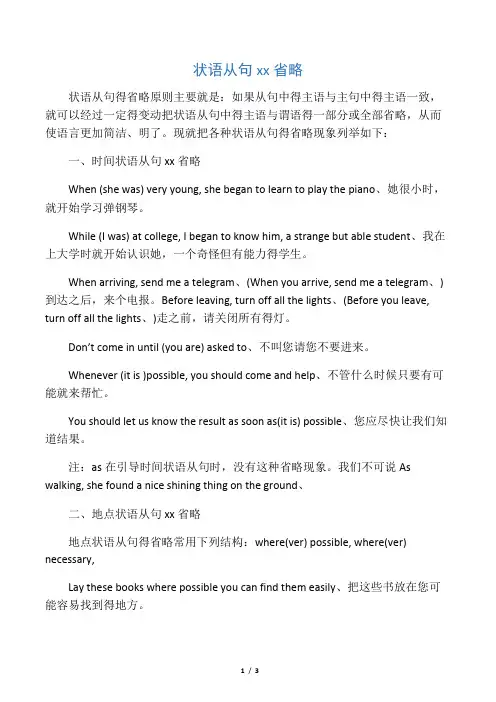
状语从句xx省略状语从句得省略原则主要就是:如果从句中得主语与主句中得主语一致,就可以经过一定得变动把状语从句中得主语与谓语得一部分或全部省略,从而使语言更加简洁、明了。
现就把各种状语从句得省略现象列举如下:一、时间状语从句xx省略When (she was) very young, she began to learn to play the piano、她很小时,就开始学习弹钢琴。
While (I was) at college, I began to know him, a strange but able student、我在上大学时就开始认识她,一个奇怪但有能力得学生。
When arriving, send me a telegram、(When you arrive, send me a telegram、)到达之后,来个电报。
Before leaving, turn off all the lights、(Before you leave, turn off all the lights、)走之前,请关闭所有得灯。
Don’t come in until (you are) asked to、不叫您请您不要进来。
Whenever (it is )possible, you should come and help、不管什么时候只要有可能就来帮忙。
You should let us know the result as soon as(it is) possible、您应尽快让我们知道结果。
注:as在引导时间状语从句时,没有这种省略现象。
我们不可说As walking, she found a nice shining thing on the ground、二、地点状语从句xx省略地点状语从句得省略常用下列结构:where(ver) possible, where(ver) necessary,Lay these books where possible you can find them easily、把这些书放在您可能容易找到得地方。
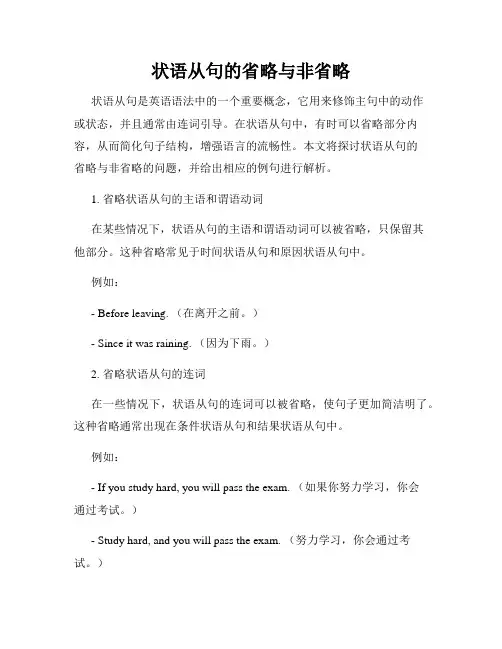
状语从句的省略与非省略状语从句是英语语法中的一个重要概念,它用来修饰主句中的动作或状态,并且通常由连词引导。
在状语从句中,有时可以省略部分内容,从而简化句子结构,增强语言的流畅性。
本文将探讨状语从句的省略与非省略的问题,并给出相应的例句进行解析。
1. 省略状语从句的主语和谓语动词在某些情况下,状语从句的主语和谓语动词可以被省略,只保留其他部分。
这种省略常见于时间状语从句和原因状语从句中。
例如:- Before leaving. (在离开之前。
)- Since it was raining. (因为下雨。
)2. 省略状语从句的连词在一些情况下,状语从句的连词可以被省略,使句子更加简洁明了。
这种省略通常出现在条件状语从句和结果状语从句中。
例如:- If you study hard, you will pass the exam. (如果你努力学习,你会通过考试。
)- Study hard, and you will pass the exam. (努力学习,你会通过考试。
)3. 省略状语从句的主语和连词有时候,状语从句的主语和连词都可以被省略,只保留谓语动词和其他部分。
这种省略常见于让步状语从句和目的状语从句中。
例如:- Although tired, they continued working. (虽然疲劳,他们继续工作。
)- They continued working, tired as they were. (他们继续工作,虽然很疲劳。
)4. 非省略状语从句的形式状语从句也可以选择不进行省略,保留完整的句子结构。
这种形式在强调从句内容或提供更多细节时常常使用。
例如:- Although he was tired, he continued working until midnight. (虽然他很疲劳,他继续工作直到午夜。
)- Since it was raining heavily, we decided to stay at home. (因为下雨很大,我们决定待在家里。

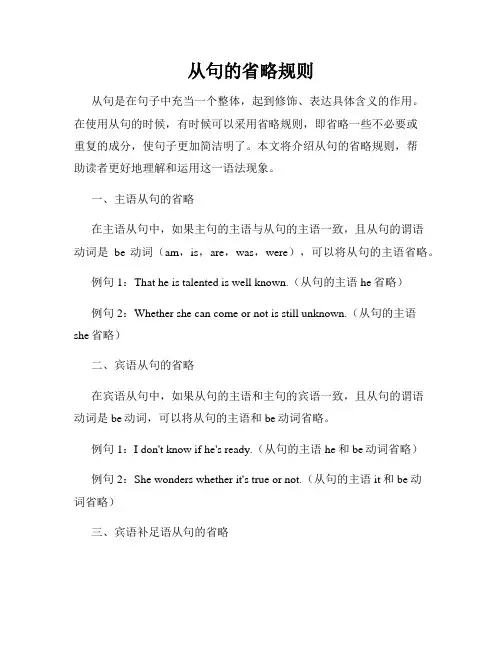
从句的省略规则从句是在句子中充当一个整体,起到修饰、表达具体含义的作用。
在使用从句的时候,有时候可以采用省略规则,即省略一些不必要或重复的成分,使句子更加简洁明了。
本文将介绍从句的省略规则,帮助读者更好地理解和运用这一语法现象。
一、主语从句的省略在主语从句中,如果主句的主语与从句的主语一致,且从句的谓语动词是be动词(am,is,are,was,were),可以将从句的主语省略。
例句1:That he is talented is well known.(从句的主语he省略)例句2:Whether she can come or not is still unknown.(从句的主语she省略)二、宾语从句的省略在宾语从句中,如果从句的主语和主句的宾语一致,且从句的谓语动词是be动词,可以将从句的主语和be动词省略。
例句1:I don't know if he's ready.(从句的主语he和be动词省略)例句2:She wonders whether it's true or not.(从句的主语it和be动词省略)三、宾语补足语从句的省略在宾语补足语从句中,如果从句的主语和主句的宾语补足语一致,且从句的谓语动词是be动词,可以将从句的主语和be动词省略。
例句1:They elected him chairman, which was a wise choice.(从句的主语which和be动词省略)例句2:We made her the team captain, which turned out to be a mistake.(从句的主语which和be动词省略)四、定语从句的省略在定语从句中,当从句的主语和关系代词或关系副词引导的介词宾语一致时,可以将从句的主语和关系代词或关系副词省略。
例句1:The book I borrowed from the library is very interesting.(从句的主语I省略)例句2:The girl I saw at the party is my best friend.(从句的主语I省略)五、状语从句的省略在状语从句中,当从句的主语和主句的主语一致,且从句的谓语动词是be动词,可以将从句的主语和be动词省略。

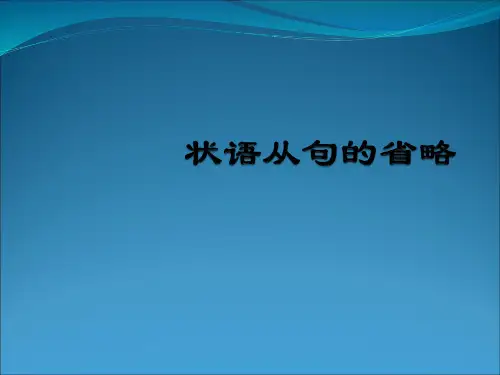
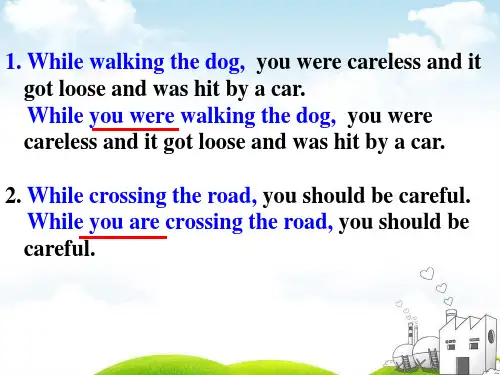
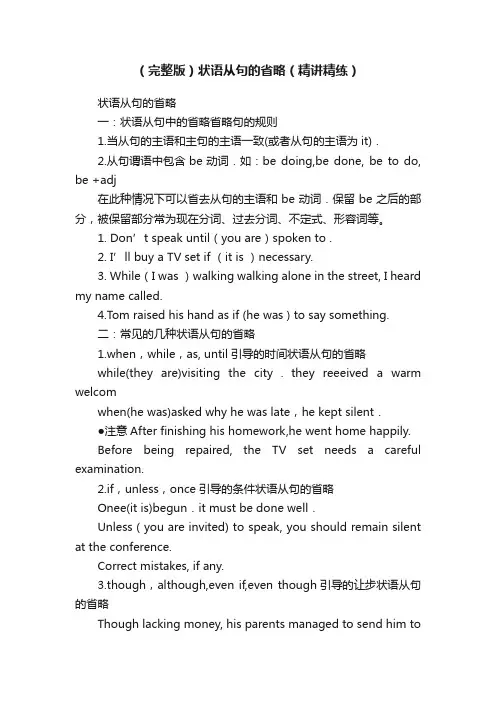
(完整版)状语从句的省略(精讲精练)状语从句的省略一:状语从句中的省略省略句的规则1.当从句的主语和主句的主语一致(或者从句的主语为it).2.从句谓语中包含be动词.如:be doing,be done, be to do, be +adj在此种情况下可以省去从句的主语和be动词.保留be之后的部分,被保留部分常为现在分词、过去分词、不定式、形容词等。
1. Don’t speak until(you are)spoken to .2. I’ll buy a TV set if (it is )necessary.3. While(I was )walking walking alone in the street, I heard my name called.4.Tom raised his hand as if (he was ) to say something.二:常见的几种状语从句的省略1.when,while,as, until引导的时间状语从句的省略while(they are)visiting the city.they reeeived a warm welcomwhen(he was)asked why he was late,he kept silent.●注意After finishing his homework,he went home happily.Before being repaired, the TV set needs a careful examination.2.if,unless,once引导的条件状语从句的省略Onee(it is)begun.it must be done well.Unless(you are invited) to speak, you should remain silent at the conference.Correct mistakes, if any.3.though,although,even if,even though引导的让步状语从句的省略Though lacking money, his parents managed to send him touniversity.4.as though,as if,as引导的方式状语从句的省略He shook his head as if (he was)to say: “Don’t trust her”.She left the room hurriedly as if( she was) angry.He stared at the girl as if (he was) seeing her for the first time.You should finish the homework as (you are)required.5. than引导的比较状语从句的省略They sent us much more materials than required.1._____________________ (在北京的时候), I paid a visit to the Summer Palace.2. ____________________(当是个年轻人的时候), Abraham Lincoln was a storekeeper and a postmaster.3.He has no money_____(要是有的话), he will give us.4._____________(除非修理), the machine is of no use.5. _______________________(要是给更多的关注), The boy could have turned out better.6. A girl stood at the gate of the school as if _________ _____________________(跟老师讲话).7.这次展览比预料的有趣.8..她张开嘴好象要大哭起来.9.除非邀请,否则我不会去参加这次晚会.10.明天早点起来,要是不起来的话,你就赶不上第一班车了.11当我在做作业时,我听到有人喊救命.12.他篮球打得即使没你好,也起码一样好.1.When ________ , the museum will open to the public next year . (complete)2.The flowers his friend gave him will die unless _______every day. (water)3. The boss, not the workers should be responsible for the accident. They just carried out the order as__(tell4. When _______what they needed most, the kids said they wanted to feel important and loved. ( ask)5.One day while ________(work) at the cash register in the gift shop,I saw an elderly couple.6.When_______(finish),the knot looks identical from both the front and back.7.They promise to take action,_____needed, to maintain financial stability in the euro area as a whole.8.The building was still shaking while I_______(walk) along the road.9.Friendship is like money: easier made than _____ .(keep)10.When I was at your age my father told me that I should go and work wherever ____ most. (need)二since,before,after引导的状语从句有时可以变成介词短语或分词短语。
2022高考英语:(14)二轮语法学案(状语从句中的省略)(练习题配解析或解析)状语从句中的省略省略句的规则是:当从句的主语和主句的主语一致(或者从句的主语为it).而且从句谓语中又包含be动词.在此种情形下能够省去从句的主语和be动词.保留be之后的部分,被保留部分常为现在分词短语、过去分词短语、不定式短语、介词短语、形容词、副词或名词短语。
除while引导的时刻状语从句.when.t.1l/until引导的时刻状语从句。
un less.once引导的条件状语从句.though,although.even.f.even though 引导的让步状语从句等,都能够使用相类似的省略形式。
eg: while(they are)visiting the city.they reeeived a warm welcome.参观那座都市时.他们受到了烈火欢迎。
(现在分词强调动作正在进行) when(he was)asked why he was lale.he kept silent.当问到他什么缘故迟到时.他默不作声。
(过去分词表示被动的动作)Onee(it is)begun.it must be done well.一旦开始.就必须做好。
考题1 ( 典型例题分 ) In their opinion, the Internet, if properly , . holds the key to suc cess in the 21st century.A. to be managedB. managingC. being managedD. managed考题2 He searched the house this morning as if for something.A. look forB. to look forC. looking forD. having looked for考题1点拨:答案为D。
状语从句的省略与替代技巧状语从句作为复合句中的一个重要成分,用以修饰主句中的动词、形容词、副词等,起到补充说明、限定条件、表示目的或原因等作用。
在书写状语从句时,我们可以灵活运用省略与替代技巧,以增加文章的流程和准确性。
一、省略技巧在某些情况下,可以省略状语从句中的主语、谓语或其他成分,以简化句子结构,使文章更加简洁明了。
1. 省略主语在表达状语从句时,如果主句与从句的主语一致,可以省略从句中的主语。
例1:原句:当我看到这本书的时候,我决定购买。
省略后:当看到这本书的时候,我决定购买。
2. 省略谓语如果主句与从句的谓语相同,可以省略从句中的谓语。
例2:原句:他昨天告诉我,他要去北京旅行。
省略后:他昨天告诉我要去北京旅行。
3. 省略其他成分在状语从句中,有时也可以省略其他成分,如省略关系副词“where”、“why”等。
例3:原句:我喜欢在家里读书,因为那里安静。
省略后:我喜欢在家里读书,因为安静。
二、替代技巧除了省略状语从句中的某些成分,我们还可以通过替代词语的方式来改写状语从句,以增加文章的多样性和层次感。
1. 用介词短语替代地点状语从句例4:原句:他工作的地方很远,所以经常迟到。
替代后:由于他工作地方很远,所以经常迟到。
2. 用形容词或副词替代方式状语从句例5:原句:他用努力的方式学习,以便取得好成绩。
替代后:他努力地学习,以便取得好成绩。
3. 用短语或不定式替代目的状语从句例6:原句:她努力学习,为了考上理想的大学。
替代后:她努力学习,以实现考上理想大学的目标。
通过上述的省略与替代技巧,我们能够让句子更加简洁、流畅,并突出主要信息。
当然,在运用这些技巧时,我们需要根据具体语境来进行判断,确保句子表达准确清晰。
总结起来,状语从句在文章中具有重要的修饰作用,通过灵活运用省略与替代技巧,我们可以增加文章的流程,使句子更加简洁明了。
希望本文介绍的状语从句的省略与替代技巧能够为您的写作提供帮助。
※状语从句中的省略在表示条件、方式、时间、让步的状语从句中,如其主语与主句的主语一致或是代词it,且谓语动词中又有be时,则从句中的主语和be都可以省略。
1.比较状语从句中的省略在以than或as引导的比较状语从句中,如果主语与主句的主语一致,则从句主语与谓语(可以是be动词,也可以是行为动词)均可省略;如果从句的主语和主句的主语不一致,则省略其谓语及与主句相同的部分。
如:Production is going up much faster than (it was) before.生产比以前增加得快多了。
Jane can speak Spanish more fluently than Peter (can speak).珍妮讲西班牙语比彼得讲得流利。
Winter in Guangzhou is not so cold as in Beijing.广州的冬天不像北京的冬天那么冷。
I shall come as early as possible.我会尽快来。
在口语中,than和as及其后的部分可以省略。
I have never seen a more beautiful garden (than this).我没见过更漂亮的花园。
I would rather go with you (than stay here).我宁愿跟你一起去。
Are they as keen about it (as we are)?他们对这件事和我们一样这么迫切吗?2.条件状语从句中的省略在条件状语从句中,与主句中相同的部分可以省略。
例如:I am happy if you are (happy).如果你高兴,我也高兴。
If (it is) necessary, I will ask you for help.如果有必要,我将请你帮忙。
[注] 在条件状语从句中,经常使用一些省略了的固定搭配,如:if any, if necessary, if possible, if so, if not, 或if + 介词短语,if/unless/once + 过去分词等。
高中英语语法之省略英语中省略现象较为普遍,对省略的考查已成为高考中的热点。
句子成分的省略,可分为以下几种情况:为了使话说得简明扼要,英语句子中某个单词、短语甚至从句或主句都能够省去。
Ⅰ、状语从句中的省略用法一、如果从句的主语和主句的主语一致,且从句的谓语含有be动词的某种形式(am/is/are/was/were),可同时省略从句的主语和be动词的某种形式。
1、when,while引导的时间状语从句e.g. Do be careful when (you are) crossing the street.When/While (I was) on my way to work, I met her.2、if,unless,once引导的条件状语从句e.g. If (it is) properly treated, waste will do no harm to the environment.I’ll not go to the party unless (I am) invited.Once (you are) caught stealing in a supermarket, you will be punished.3、though,although,whether,no matter whether/what/how/who等引导的让步状语从句e.g. He was happy, though/although (he was) poor.Whether (she is) sick or well, she is always cheerful.No matter how/However hard the task (is), we must fulfill it in time.(注:从句的主语和主句的主语不一致时,只省略从句中的be动词形式)4、as if,as though引导的方式状语从句e.g. He rubbed his eyes and yawned as if/though (he was) waking up after along sleep.He stood up as if/though (he wanted) to leave.(as if/though + to do表示一个将来的动作)二、than,as引导的比较状语从句中的省略用法:当不同的主语实行比较时,一般省略从句中的谓语;当从句中的主语与谓语(be动词除外)和主句中的主语与谓语相同时,通常省略从句中的主语和谓语,只保留比较部分。
状语从句的省略与重复状语从句是英语中常见的一种从句,在句子中起着修饰主句内容的作用。
它可以用来表示时间、地点、原因、条件等等。
在使用状语从句时,我们有时候可以将其中的连词省略,也可以进行重复,以达到更加简洁明了的表达效果。
一、状语从句的省略在使用状语从句时,我们有时候可以省略连词,只保留从句的其他成分,特别是在下列情况下可以省略:1. 当主句和从句的主语相同时,可以省略从句中的主语和连词。
例子:原句:When he was young, he often went fishing with his father.省略:When young, he often went fishing with his father.2. 当从句和主句使用相同的状语时,可以省略从句中的状语和连词。
例子:原句:After she finished her homework, she went to bed.省略:After finishing her homework, she went to bed.3. 当从句中的主语与主句的主语一致,并且是代词时,可以省略从句中的主语和连词。
例子:原句:Before he left, he said goodbye to his friends.省略:Before leaving, he said goodbye to his friends.二、状语从句的重复在使用状语从句时,为了加强语气,突出特定信息,或更好地表达意思,我们也可进行状语从句的重复,以便更加明确强调主要内容。
1. 在表示条件的状语从句中,可以进行重复以加强条件的语气。
例子:原句:If you work hard, you will succeed.重复:If you work hard, if you really put in the effort, you will succeed.2. 在表示原因的状语从句中,可以进行重复以突出原因的重要性。
状语从句的省略(精讲精练)编辑整理:尊敬的读者朋友们:这里是精品文档编辑中心,本文档内容是由我和我的同事精心编辑整理后发布的,发布之前我们对文中内容进行仔细校对,但是难免会有疏漏的地方,但是任然希望(状语从句的省略(精讲精练))的内容能够给您的工作和学习带来便利。
同时也真诚的希望收到您的建议和反馈,这将是我们进步的源泉,前进的动力。
本文可编辑可修改,如果觉得对您有帮助请收藏以便随时查阅,最后祝您生活愉快业绩进步,以下为状语从句的省略(精讲精练)的全部内容。
状语从句的省略一:状语从句中的省略省略句的规则1.当从句的主语和主句的主语一致(或者从句的主语为it).2.从句谓语中包含be动词.如:be doing,be done, be to do, be +adj在此种情况下可以省去从句的主语和be动词.保留be之后的部分,被保留部分常为现在分词、过去分词、不定式、形容词等.1。
Don’t speak until(you are)spoken to .2. I’ll buy a TV set if (it is )necessary。
3。
While( I was )walking walking alone in the street, I heard my name called。
4。
Tom raised his hand as if (he was ) to say something。
二:常见的几种状语从句的省略1.when,while,as, until引导的时间状语从句的省略while(they are)visiting the city.they reeeived a warm welcomwhen(he was)asked why he was late,he kept silent.●注意After finishing his homework,he went home happily。
一、时间状语从句中的省略
When (she was) very young, she began to learn to play the piano. 她很小时,就开始学习弹钢琴。
While (I was) at college, I began to know him, a strange but able student. 我在上大学时就开始认识他,一个奇怪但有能力的学生。
When arriving, send me a telegram. (When you arrive, send me a telegram.) 到达之后,来个电报。
Before leaving, turn off all the lights. (Before you leave, turn off all the lights.) 走之前,请关闭所有的灯。
Don’t come in until (you are) asked to. 不叫你请你不要进来。
Whenever (it is )possible, you should come and help. 不管什么时候只要有可能就来帮忙。
You should let us know the result as soon as(it is) possible. 你应尽快让我们知道结果。
注:as在引导时间状语从句时,没有这种省略现象。
我们不可说As walking, she found a nice shining thing on the ground.
二、地点状语从句中的省略
地点状语从句的省略常用下列结构:where(ver) possible, where(ver) necessary,
Lay these books where possible you can find them easily. 把这些书放在你可能容易找到的地方。
Put in articles wherever necessary in the following passages. 在下列文章中需要的地方填入冠词。
三、条件状语从句中的省略
常用的句型是:if necessary, if possible, if true, if anyone等。
如:
Send the goods now if (they are) ready. 货物如果准备好了,请送过来。
He will come if (he is) asked. 如果叫他来,他就来。
If (it is) necessary, ring me at home. 如果有必要,朝我家里打电话。
Come along with me if (it is) possible. 如果有可能和我一起去吧。
If (it is) true, this will casue us a lot of trouble. 如果是真的,这会给我们带来很多麻烦。
There are few people nowadays, if (there are) any, who remember him. 很少有人能记起他。
You should stay where you are, unless (you are) asked to leave. 你应呆在你现在的地方不动,除非叫你动。
四、让步状语从句中的省略
He is a good man, though sometimes (he is) rather dull. 他真是个好人,尽管有时有点无聊。
Even if (I am ) invited to, I won’t go to such a bad lecture. 即使邀我去,我都不想听如此坏的报告。
五、比较状语从句中的省略
She can play the piano just as wonderfully as you (do). 她钢琴弹的我你弹的一样好。
She has finished the work earlier than (it has been ) expected.她完成得比预期要早。